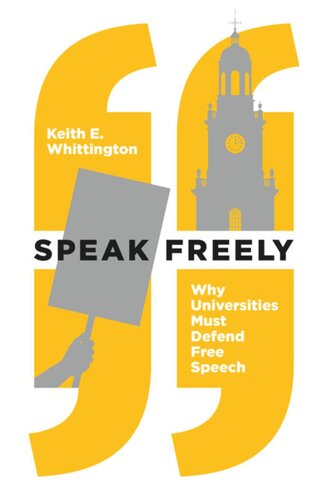

Most ebook files are in PDF format, so you can easily read them using various software such as Foxit Reader or directly on the Google Chrome browser.
Some ebook files are released by publishers in other formats such as .awz, .mobi, .epub, .fb2, etc. You may need to install specific software to read these formats on mobile/PC, such as Calibre.
Please read the tutorial at this link: https://ebookbell.com/faq
We offer FREE conversion to the popular formats you request; however, this may take some time. Therefore, right after payment, please email us, and we will try to provide the service as quickly as possible.
For some exceptional file formats or broken links (if any), please refrain from opening any disputes. Instead, email us first, and we will try to assist within a maximum of 6 hours.
EbookBell Team

4.8
44 reviewsWhy free speech is the lifeblood of colleges and universities
Free speech is under attack at colleges and universities today, with critics on and off campus challenging the value of open inquiry and freewheeling intellectual debate. Too often speakers are shouted down, professors are threatened, and classes are disrupted. In Speak Freely, Keith Whittington argues that universities must protect and encourage free speech because vigorous free speech is the lifeblood of the university. Without free speech, a university cannot fulfill its most basic, fundamental, and essential purposes, including fostering freedom of thought, ideological diversity, and tolerance.
Examining such hot-button issues as trigger warnings, safe spaces, hate speech, disruptive protests, speaker disinvitations, the use of social media by faculty, and academic politics, Speak Freely describes the dangers of empowering campus censors to limit speech and enforce orthodoxy. It explains why free speech and civil discourse are at the heart of the university’s mission of creating and nurturing an open and diverse community dedicated to learning. It shows why universities must make space for voices from both the left and right. And it points out how better understanding why the university lives or dies by free speech can help guide everyone—including students, faculty, administrators, and alumni—when faced with difficult challenges such as unpopular, hateful, or dangerous speech.
Timely and vitally important, Speak Freely demonstrates why universities can succeed only by fostering more free speech, more free thought—and a greater tolerance for both.